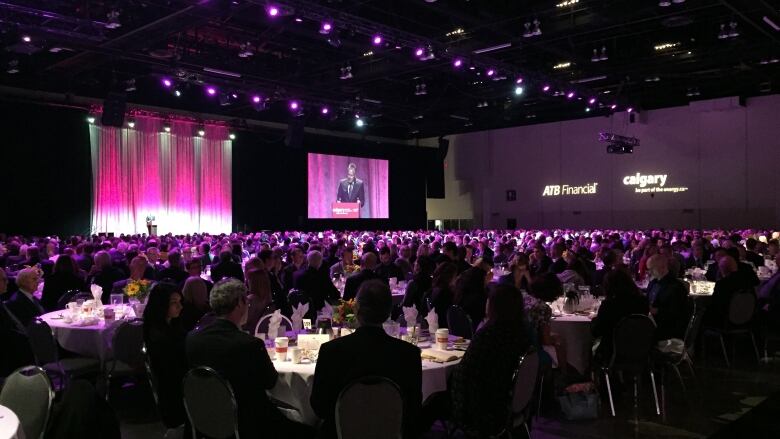Stephen Poloz on riding the energy roller coaster
Calgary audience wanted to know when oil might recover. Canada's top banker didn't have the answers

Here aretwo facts about Calgary right now:
Everyone in the city is preoccupied with the price of oil. And no one knows where it's heading.
Oh my goodness. What's the next question? Stephen Poloz, when asked when oil prices would recover
That was evident as Bank of Canada governor Stephen Poloz delivered a speech to nearly1,600 besuitedlawyers, bankers and oil executivesas part of the Calgary's annual economic forecast lunch.
After his speech,Poloz took six questions from the audience. The firstwas about when the oil cycle was likely to turn up.
"Oh my goodness," said Poloz. "What's the next question?"
Pause for laughter.
"No, seriously, what's the next question?"
The governorwent on to answervery generally about supply and demand and said eventually that prices would go up, without attaching a time frame or price to the forecast.
A few minutes later, it came up again. What are the chances that oil will fall to $20 a barrel, like Goldman Sachsrecently said might happen?
Polozquite smartly declined to make a guess on $20 oil.But you can't fault the audiencefor wanting to ask Canada's top economist if he has any clue about where crudeis heading. The governor joked that there were people in the audience who would know that answer better than him, but that's not necessarily true. Crude prices have been veering wildly over the past year.
Good times over?
Appropriately, the title of the governor's speech was Riding the Commodity Cycle.Alberta has ridden high on that cycle for five years.The economy grew rapidly, jobs were plentifuland Albertans made more money than any other group of Canadians.
Times were good and the question that preoccupies Albertans is this: Arethose good timesover, or is everything just on pause?
- Alberta in recession this year, ATB's Todd Hirsch says
- Alberta has lost 35,000 oilpatch jobs, petroleum producers say
- Joe Ceci promises job creation plan as oil and gas layoffs continue
The assessment from the forecast lunch is that $100 oil is not coming back any time soon. Glen Hodgson, the chief economist of the Conference Board of Canada delivered hiseconomicforecast for 2016 and suggested that he didn't expect to see $100 oil again in his career asan economist.
Both Hodgson and Todd Hirsch, the chief economist of ATB Financial, who was also at the lunch, forecast $60 US oil by the end of next year.
That would bring oil closer in line with long-term trends.Research done by economist Ken Green of the FraserInstitute shows that oil has averaged $40 US a barrel since the Second World War, when adjusted for inflation.
In the meantime though, it's a tough adjustment.
Wages still too high
"It's like we slipped on ice and very suddenly went from being the fastest growing economy in the country to one likely in recession," Hirsch told the crowd,"We've slipped and fallen on our backs."
For his part,Polozsaid thatCanada is caught in a global commodities "super-cycle" and it could be "considerable time" before the resource sector adjusts.
Part of that adjustment has to do with costs in the industry. Hirsch made the point that over the past five years, bonuses, compensation andovertime hours together have caused Albertans to earn much more than other Canadians.
In the past ten years, the average wage of Canadians grew by 29 per cent. The average wage of oil and gas workers grew by almost twice that at 56 per cent.
That is starting to change as people lose oilpatch jobs and find work in sectors that simply don't pay as well.
The other consistent theme in the forecast luncheon was that the resource cycle will eventually rebound. The world'spopulation is still growing, fossil fuels will remain the majority of the energy mix for the foreseeable future.
Polozpointed out thatCanada is still a resource economy, although his speechfocused more on agriculture and the fisheries. We may be exporting less oil, but Canada is flying 60,000 lobsters to China every week.
Whichis nice, since lobster might be out of Albertans' budgets for the foreseeable future.












_(720p).jpg)


 OFFICIAL HD MUSIC VIDEO.jpg)
.jpg)



























































































